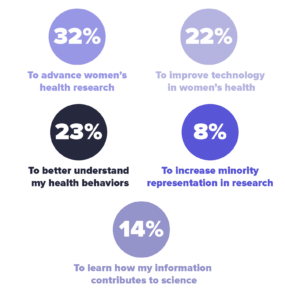![]()
March 2023: The Apple Women’s Health Study is celebrating International Women’s Day by thanking its participants for all their efforts and contributions in its first three years.

“Women’s health has not been studied enough. The Apple Women’s Health Study allows for generating new knowledge about all women that will lead to better practices and policies to improve women’s physical and mental health.”
– Michelle A. Williams, SM ’88, ScD ’91, Leadership Team, Former Dean of Harvard T.H. Chan School of Public Health
The Apple Women’s Health Study is the first digital study involving real-time data from more than 100,000 people across the United States and its territories. We have had an extraordinary first three years thanks to the contributions of study participants. Survey responses and menstrual cycle data collected over the past 36 months have helped our team begin to understand how certain behaviors and habits could affect menstrual cycles and gynecological health. This data will continue to expand the knowledge of not only women’s health but public health. Thanks to the dedication of our participants, we have and will continue to help revolutionize women’s health.
What our participants told us on why they are contributing.

“This is an opportunity to demystify menstrual cycles, to break the stigma of menstruation, and to better understand how menstrual cycles affect women’s health.”
– Huichu Li, Former Postdoctoral Research Fellow
Our study team is working toward one goal; gaining a deeper understanding of how certain demographic and lifestyle factors could affect menstrual cycles and gynecologic conditions including infertility, menopause, and polycystic ovary syndrome (PCOS).
Participants have enthusiastically joined the study, helping us achieve this goal. When asked why they joined the study, participants said…

These reasons are components of the study’s overall objective. We are working toward findings that will continue to represent our participants’ areas of interests.
Revolutionizing health research.

“This research matters to me because menstrual health is finally being recognized as a vital sign like heart rate or blood pressure. An experience that has been anecdotally recognized as a tell-tale bodily sign for people who menstruate for thousands and thousands of years is being comprehensively researched.”
– Malaika Gabra, Research Assistant
Participant data is demonstrating important insights across the menstrual cycle and overall health, including period symptoms, polycystic ovary syndrome (PCOS) and heart health, attempting pregnancy during the pandemic, and menstrual cycle variability. More importantly, this information has provided the framework for future analyses of menstrual health and its relationship to our overall health.
Researching the effects of current events on women’s health.
During the COVID-19 pandemic, our team, with the support of our participants, was able to continue the study uninterrupted as well as investigate the effects of aspects of the pandemic on women’s health.
The Apple Women’s Health Study investigated how COVID-19 affected attempts to conceive. Over 21,000 participants contributed data, through surveys, to the scientific publication of Attempts to Conceive and the COVID-19 Pandemic: Data from the AWHS.
Later, our team explored the effect of COVID-19 vaccination on menstrual health. Thanks to the support of our participants, our team published one of the early scientific evaluations of the impact of vaccination on menstrual cycle characteristics: COVID-19 vaccination and menstrual cycle length in the AWHS. It found that menstrual cycle change following COVID-19 vaccination appears small and temporary and should not discourage individuals from becoming vaccinated.
Looking at the menstrual cycle over a lifespan.

“I think the study is novel and exciting. The idea of collecting data on such a massive scale opens so many doors on the research questions we can answer.”– Ariel Scalise, Project Manager
Our participants represent all 50 states, Washington D.C., and some U.S. territories, and range from 18 to 90 years old. Because of this, our team can investigate reproductive health in individuals at different stages of life, starting at young adulthood all the way through senior years. The opportunity to look at reproductive health over people’s lifespans is what makes this study so unique and will enable us to continue to contribute to public health research.
In Periods, polycystic ovarian syndrome, and heart health, the team analyzed survey data from the Apple Women’s Health Study to help us understand the relationship between persistent abnormal periods, polycystic ovarian syndrome (PCOS), and heart health. Our study update provides information about health conditions that impact many people – abnormal periods, PCOS, and heart health conditions. PCOS impacts the whole-body health of as many as 20% of women of reproductive age worldwide. Despite the association between PCOS and heart-related conditions, historically, research studies about heart health have not included information about menstrual cycles.
In a study update, Menstrual cycles today: how menstrual cycles vary by age, weight, race, and ethnicity, we explored how those demographic characteristics are associated with menstrual cycle characteristics, including both menstrual cycle length and menstrual cycle irregularity. Our analysis confirmed previous observations of differences in menstrual patterns with age and body weight, but also explored racial and ethnic differences of menstrual characteristics. Thanks to our participants’ contributions, we were able to explore menstrual cycle variation and provide foundational information for future research.
Our team is continuing to explore the effects of our current environments on menstrual health.
Contributing to advancement in health technology.

“The ubiquity of smartphones makes it possible for researchers to collect longitudinal data in a real-world setting in a manner that can open research participation to diverse groups. Better data can potentially be transformative for this field.”
– Jukka-Pekka “JP” Onnela, Leadership Team
Menstruation is often overlooked as a window to our overall health. But it is a crucial part of human health and physicians see it as a vital sign as useful to monitoring health as heart rate and blood pressure. Unique insights from the study have helped inspire and validate new features for iPhone and Apple Watch users that are empowering people to be at the center of their health.
For example, the Apple Women’s Health Study helped us identify that 16% of study participants were experiencing abnormal uterine bleeding. Our publication in the American Journal of Obstetrics and Gynecology details the data around identifying abnormal uterine bleeding patterns and their prevalence and confirming existing and expected associations with demographics and medical conditions.
These insights supported the release of Apple’s Cycle Deviations feature, where Cycle Tracking users can be notified if a cycle deviation is detected. These include irregular periods, infrequent periods, prolonged periods, and persistent spotting, and are based on clinical guidelines, including those identified as common cycle deviation types by the International Federation of Gynecology and Obstetrics.
The study has also led to improved period and fertile window predictions in Apple’s Cycle Tracking app.
What is next?

“Joining the Apple Women’s Health Study is a unique opportunity to contribute to the population experience to understand what may influence the menstrual cycle and overall health. Contributing to the study as a participant may facilitate understanding of subpopulations at risk, and help identify sources of risk for health conditions across the lifespan.”
– Shruthi Mahalingaiah, MD, MS, Leadership Team
With the support of you — our broad and diverse participant base — our long-term study is poised to continue to meaningfully contribute to health research. It is important that we continue to study and expand our knowledge of menstruators and their menstrual health over the course of their lives, to better equip menstruators and healthcare providers to receive and provide the best care possible.
We are excited to learn and share more insights with our participants and the public.
The Apple Women’s Health Study research team would like to thank its participants for their contributions during the first three years of the study and for helping to advance women’s health research.
The study is enrolling participants. Join now by downloading the Research app.
For answers to common questions, please visit the FAQ.
To meet our study team, please visit Meet the Team.

You must be logged in to post a comment.